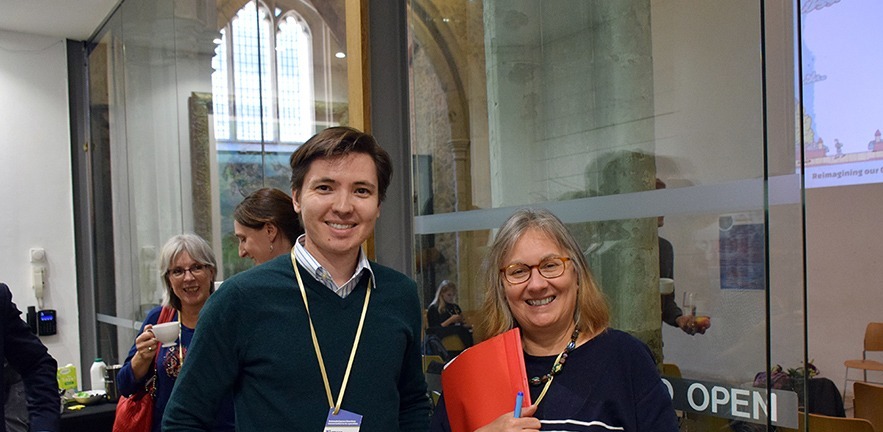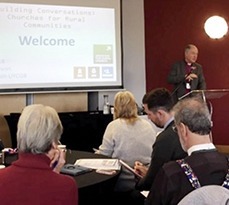REACH Ely took part in conferences and workshops in London, Paris and Coventry to discuss the re-imaging of churches.

Reimagining Our Churches – a conference in London
On 9 October 2018, the project team took part in the conference and workshops on re-imagining churches from conservation to co-operation organised by Stir to Action, a non-profit that runs workshops, supports community enterprises, and publishes a quarterly magazine.
The event brought together church representatives, community enterprise practitioners, and heritage sector experts. The conference and workshops were useful in meeting community enterprise experts and establishing networking links, spreading the word about the newly launched REACH Ely project, and learning about ongoing innovative church building projects in the UK.
One of the highlights of the event was Becky Payne’s presentation of the updated edition of Crossing the Threshold, a step-by-step guidance for parish churches on developing places of worship for wider community use. The guidance was published by the Historic Religious Buildings Alliance in collaboration with the Diocese of Hereford.
Stir to Action also presented a year-long pilot Unlocking the Next Economy: Churches and Community Enterprise that supports and encourages communities to repurpose physical assets of churches for local economic change. The project targeted three communities in the South of England (a United church in Bridport, a Baptist church in Exeter, and an Anglican church in North Molton).
The convention took place at St Ethelburga Bishopsgate church in the heart of the bustling City of London. The venue itself is a symbolic place for gatherings of community-minded people. In 1993 an IRA bomb severely damaged the church and once the building was rebuilt and restored it re-opened as a Centre for Reconciliation and Peace.
Europe’s religious heritage legacy discussed in Paris conference
Geoffrey Hunter, the Diocese of Ely Church Buildings Consultant, participated at the Future for Religious Heritage conference Religious Heritage – Europe’s Legacy for the Future held at the UNESCO headquarters in Paris, France in October 2018. With more than 200 participants from 24 countries and 65 organisations, the conference brought together experts from the field of religious and cultural heritage, academics, representatives from EU institutions and public and private organisations.
Among the topics on good governance, participants discussed initiatives related with a wider use of church buildings in the EU. Particularly, discussions on the relationship between churches and civil society in what is termed as a “post-secular” world and insights into what people mean by “spiritual” when they visit a church for non-religious reasons.
The next Future for Religious Heritage conference will be held in 2020.
Growing the Rural Church – event in Coventry

Timur Alexandrov, Research Associate of REACH Ely, took part in the full-day ecumenical conference Growing the Rural Church organised by the Diocese of Exeter on 31 October 2018. The event explored how rural churches can use their buildings creatively to support their ministry and better serve their communities. The convention brought together community development experts and church practitioners. Presentations covered the issues of the parish church becoming the only meeting place for village communities, ways to save existing churches from closure, ideas on reaching out to communities, cross-sector partnerships, and outsourcing expertise and advise on community development from consulting firms.
The day also included workshops and talks from keynote speakers from New Zealand, Arthur Rank Centre, dioceses of Exeter and St Edmundsbury and Ipswich who shared their success stories and called for a pro-active approach in valuing church assets and managing change. It was noted that rural churches need to get to know their non-members particularly and recognise the way they already belong: through cultural activities, events, people, place, their experiences and skills.
Marian Carson, the Project Manager of the Diocese of Exeter and the conference organiser, presented Growing the Rural Church, a community project launched in Devon in 2017 that supports churches with their local communities and external agencies.

